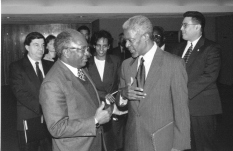|
"Nothing would
resolve the U.N. financial crisis more quickly than if Member States simply paid their bills."
|
Africa should receive U.N.'s undivided attention, says Annan
UNITED NATIONS, Jan 10 (IPS/G77)— U.N. Secretary-General Kofi Annan says that while he will do everything in his power to ensure the needs of the least developed countries (LDCs), he would also give his undivided attention to the crisis-stricken African continent. “Many of its problems are more acutely serious than those of other regions,” Annan said in an interview with the JOURNAL OF THE GROUP OF 77. The Secretary-General pointed out that Africa’s human and natural resources are enormous, “and so we must not lose heart.” “Persistent and focused development efforts can and will pay off. Having seen dramatic changes in Ghana, I remain an optimist,” he said.
Excerpts from the interview:
JOURNAL: What would be the effective way of resolving the “current financial crisis” of the U.N?
ANNAN: Nothing would resolve the UN financial crisis more quickly than if Member States simply paid their bills. For some Governments, it is a matter of financial hardship. For others, it is a political matter. I can do no more than appeal to Member States to meet their obligations, starting with the United States, which is the biggest debtor.
JOURNAL: How could the U.N. be more effective in the field of development and international cooperation?
ANNAN: There are two problems here. One is that the UN system itself is not sufficiently co-ordinated when it comes to development. I shall be looking closely at the structure, with a view to tighter consolidation of our efforts. We must bolster the credibility of the United Nations in this area. But much of this is beyond the authority of the Secretary General alone; Governments too must make choices. The second problem is one of shrinking resources. I fear that Governmental assistance is in decline for the long term. We must adjust our sights, but also our approaches. I will do everything in my power to ensure that the needs of the poorest citizens of the least developed countries are not forgotten by the international community.
 |
Ambassador Daudi N. Mwakawago of Tanzania, Chairman of the Group of 77, and U.N. Secretary-General Kofi Annan exchanging views on the occasion of the turnover cremony of the Chairmanship of the Group of 77 on 20 January 1997. |
JOURNAL: Africa has received particular attention from the UN. How do you see the future of African development?
ANNAN: Africa of course must receive our undivided attention. Many of its problems are more acutely serious than those of other regions. Yet its human and natural resources are enormous, so we must not lose heart. Persistent and focused development efforts can and will pay off. Having seen dramatic changes in Ghana, I remain an optimist.
JOURNAL: What do you see as the major challenges now facing the U.N.?
ANNAN: I will mention four. In the area of peace and security, the world is still adjusting to the end of the Cold War. Member States are in the process of redefining their relations with each other. They must also define what kind of United Nations they want. One of my first efforts will be to help nations reach a consensus on this question, and then to build on it. Then, we must give the highest priority to establishing mechanisms to try and avert conflicts from erupting or spreading, and spend less by taking preventive actions early rather than spending more on peace-keeping operations after conflagrations have erupted. On the issue of sustainable development, as I mentioned, we must ask how to fuel economic growth as development resources shrink. Where there is growth, we must ask how it can be more equitably distributed. And we must restore the confidence of donor Governments in our work in this area. Lastly, there is human rights. One of the United Nations’ strongest and least recognized contributions is in the establishment of international norms of human rights, and in promoting and protecting them in practice. The challenge is to work with Member States and the global human rights movement to make the application of these norms --civil, political, economic, social, and cultural-- a living reality for individuals around the world. The entrenchment of a culture of human rights offers the best protection against intolerance, discrimination and injustice, especially against minority populations.
|

